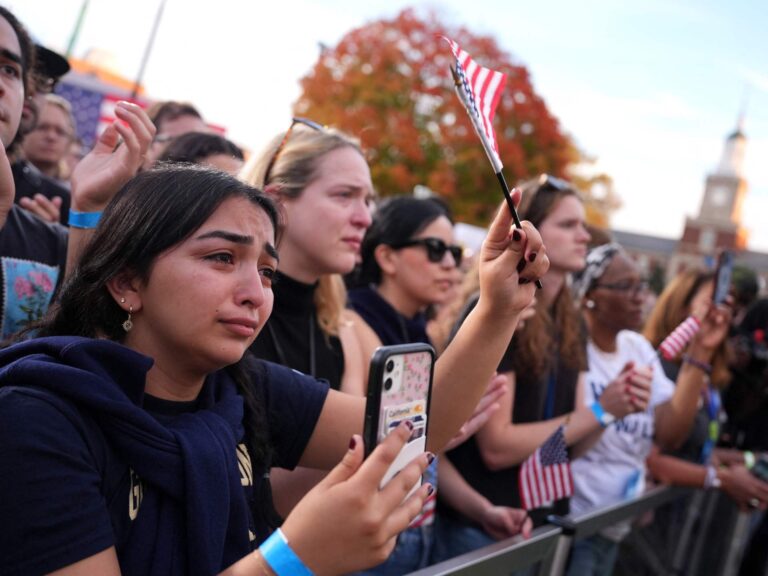FBI Investigates Racist Text Messages Targeting Black Americans
FBI Investigates Racist Text Messages: A Wake-Up Call for Justice
In today’s fast-paced digital world, where a simple text can travel from one person to another in an instant, it’s alarming to see how this convenience can be weaponized. Recent investigations by the FBI into heinous racist text messages targeting Black Americans have ignited a firestorm of outrage across the nation. These texts, which are not just words on a screen but venomous symbols of deep-rooted discrimination, emphasize how crucial it is to address the ugly remnants of racism in our society. In this article, we will explore the details around the FBI’s investigation, dissect the impact these messages have on communities, and discuss what measures can be taken to eradicate such toxic behavior.
A Disturbing Trend
The incident in question isn’t an isolated one. Reports of racially charged messages have been surfacing for years, but this particular case has caught national attention. Why? Because it serves as a reminder that racial tension still simmers beneath the surface of our society. The messages in question have ranged from derogatory remarks about Black individuals to outright threats. Imagine receiving a text filled with hate while you’re just trying to go about your day. It’s distressing, to say the least.
The Background of the Investigation
When the FBI steps in, you know it’s serious. In this case, they were alerted to the messages after reports from individuals and community organizations claiming that the texts contained racist slurs and violent threats. Social media played a key role here; the messages quickly spread, leading to community outrage. As the temperature rose, so did the urgency for law enforcement to take action. The investigation isn’t solely about punishing the offenders but also about sending a loud and clear message: hate has no place in our society.
The Impact of Racist Text Messages
You might be thinking, “They’re just words; how harmful can they be?” But let’s unpack that a bit. Words have power—even more so when they are imbued with prejudice and malice. Racist messages can lead to:
-
Psychological Effects: Constant exposure to racist messaging can lead to anxiety, depression, and a host of other mental health issues within targeted communities. Feeling unsafe in your own skin can be a heavy burden.
-
Community Divisions: Such messaging can fuel divisions in communities, leading to mistrust among residents, and even sparking violence. We see this time and time again—hate breeds hate.
-
Cultural Challenges: When racist messages go unchecked, they perpetuate stereotypes and make it harder for communities of color to heal. It’s like adding fuel to a fire that never seems to go out.
A Call to Action
It’s essential for us as a society to not just stand idly by. The FBI’s involvement might be a step toward addressing these issues, but what can we do as individuals? We can amplify good and stand against hate. But how? Here are a few suggestions:
-
Educate Yourself and Others: Knowledge is power. Dive into resources that teach about race, privilege, and systemic inequality. Just a small shift in perspective can foster greater empathy.
-
Speak Out: Silence is complicity. If you hear something racist or see disparaging messages, don’t let it slide. Challenge them, whether it’s on social media or face-to-face.
-
Support Local Initiatives: Many organizations are dedicated to combating racism. By volunteering, donating, or advocating for these initiatives, you’re fighting the good fight.
The Role of Social Media
Social media is a double-edged sword. It allows for the quick dissemination of information but can also propagate hate at lightning speed. In the case of these racist text messages, social media played a crucial role in surfacing the issue. Communities banded together, using hashtags and sharing posts to elevate their concerns.
Moving Towards Accountability
The internet may be vast, but that doesn’t mean perpetrators of hate and violence should be off the hook. The FBI’s investigation signals a move towards accountability. Imagine if every instance of discrimination led to real consequences for the offenders. Would we see a reduction in such messages? It’s a hopeful thought.
Legal Ramifications
There’s a crucial legal aspect to consider. Hate speech, while often protected under the First Amendment, can cross boundaries into harassment or threats, making it punishable by law. Each case is unique, and the context matters. The law can be tricky, but awareness of it can be empowering for those who feel targeted. That said, many advocates are calling for clearer definitions and firmer penalties regarding hate speech, particularly in the age of technology.
The Community Response
As reports of these racist text messages began to surface, the community response has been both swift and profound. Rallies and gatherings emerged, highlighting the need for dialogue and change. Local leaders stepped up, using their platforms to call for justice and equality. It’s inspiring to witness communities coming together to counteract hate. But can this momentum be sustained? That remains to be seen.
Healing and Moving Forward
The road to healing after racism and hate is often long and fraught with challenges. Conversations about race and inequality are uncomfortable but necessary. Everyone has a role to play in creating a more inclusive society.
Building Bridges
Can we think of these challenges as opportunities for growth? Just as a builder lays down a foundation before erecting a house, we must lay down the groundwork of understanding, compassion, and respect. Engaging in open dialogue, even when it’s tough, can forge stronger connections within communities.
Conclusion
The FBI’s investigation into the racist text messages targeting Black Americans serves as a profound reminder of the ongoing battle against racism in our society. It invites us to reflect on the broader implications of hate and the urgent need for accountability and justice. As we move forward, let’s commit to being part of the solution rather than remaining silent bystanders. Together, we can create a world where everyone feels safe, respected, and valued.
FAQs
-
What should I do if I receive a racist text message?
- If you receive a racist text message, consider reporting it to the authorities and to the platform through which it was sent. Documenting evidence can also be vital.
-
How can I get involved in anti-racism initiatives?
- Start by researching local organizations dedicated to combating racism. You can volunteer your time, donate, or educate others about these important issues.
-
Is there legal protection against hate speech?
- Hate speech can be challenging to address legally, as it’s often protected under the First Amendment. However, threats and harassment may be subject to legal consequences.
-
Can social media contribute to the spread of racism?
- Yes, social media can amplify racist messages, enabling them to reach wider audiences quickly. However, it can also serve as a tool for activism and community organizing against hate.
-
How can we ensure accountability for hate speech?
- Advocating for clearer definitions of hate speech and stronger penalties for offenders, alongside community education and awareness efforts, can foster accountability in society.







